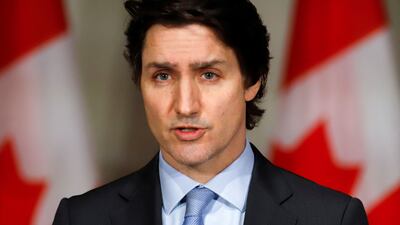The Canadian government is lifting the emergency powers it enacted more than a week ago to bring street protests under control, with Prime Minister Justin Trudeau saying the unprecedented authority is no longer needed.
His government invoked the never-before-used Emergencies Act after hundreds of lorries and other heavy vehicles blockaded the centre of Canada’s capital of Ottawa for three weeks. The demonstration sparked offshoots that shut down key border crossings, including the Ambassador Bridge to Detroit.
“Today, after careful consideration, we’re ready to confirm that the situation is no longer an emergency,” Mr Trudeau said alongside his attorney general and other top ministers on Wednesday.
“We are confident that existing laws and bylaws are now sufficient to keep people safe.”
The legislation gave authorities the financial tools to cut off funding to the protesters and compel towing firms to clear out the vehicles, among other measures.
Canadian banks froze about C$7.8 million ($6.1m) in a little more than 200 accounts under the emergency powers, government officials told members of Parliament on Tuesday.
At the weekend, police sourced from across the country cleared Ottawa’s streets of vehicles and protesters, although some demonstrators relocated to encampments outside the city. Mr Trudeau said police now believe they have the situation under control.
The Emergencies Act allows authorities to declare certain areas no-go zones, allows police to freeze drivers’ and their supporters' personal and corporate bank accounts, and compels towing companies to haul away vehicles.
The prime minister announced he was invoking the emergency powers on February 14 and they were formally enacted the next day. The 34-year-old legislation gave federal officials sweeping authority to handle an emergency that they said lower levels of government couldn’t handle under existing laws.
The Canadian Civil Liberties Association and other groups have already challenged the use of the emergency law in court, arguing the driver-led protest against vaccine mandates and other Covid-19 restrictions doesn’t meet the threshold.
Mr Trudeau, however, had been coming under increasing public pressure to take action after Ottawa’s municipal police force showed itself to be either unwilling or incapable of cracking down on demonstrations and removing vehicles from the streets.
Ottawa’s police chief resigned the day the emergency powers came into effect.
Agencies contributed to this report












